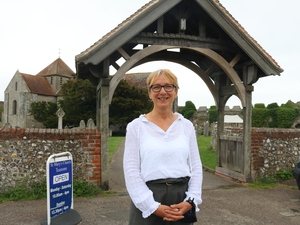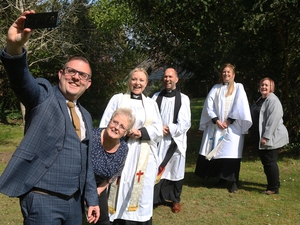Diocesan Synod, June 2020
The June 2020 Diocesan Synod took place via Zoom, because of the restrictions imposed during the coronavirus pandemic. Members were still able to speak to individual topics and met as groups for the final item. But because of these unusual circumstances, an extra Diocesan Synod meeting is planned for September 19.
PRESIDENTIAL ADDRESS
Bishop Christopher’s presidential address acknowledged the unprecedented times we are living in and praised parishes and the central diocesan team for their flexibility and innovation in continuing the Church’s work of ministry and mission. He outlined the challenges we might face in the future, including the three potential groups we need to cater for: those who might meet in church buildings; those engaging at home via digital methods; and those at home who do not have easy access to the internet. He also outlined some of the financial challenges our diocese is likely to face, given the effect of COVID-19 on parish and diocesan finances. To read the full address, click here.
GENERAL SYNOD REPORT
The Church of England’s General Synod had not met since the last Diocesan Synod in February. It was due to meet in July 2020, but that is likely to be an informal meeting on July 11, via Zoom.
The current five-year synod was due to end with this July’s York sessions, with elections for the new Synod taking place this summer. Due to the coronavirus restrictions, these elections cannot take place on an adequate basis, and therefore the Archbishops have, under special provision contained in the Coronavirus Act 2020, requested an Order in Council to postpone the elections to General Synod by 12 months, enabling the life of the current General Synod to be extended by a further year and avoiding the requirement for dioceses to hold elections this summer. The Inaugural Session of the new Synod will therefore not take place until November 2021. This will mean that existing members of Synod will serve for a further 12 months and that any casual vacancies that arise before 13 July this year must be filled.
BISHOP’S COUNCIL UPDATE
Diocesan Secretary Victoria James presented a paper on the work of Bishop’s Council over the past three months, which can be read here. One of the Council’s decisions had been to approve the furloughing of around half the central diocesan team, with individuals in some departments taking it in turns to be furloughed as appropriate. As most of the diocesan budget is spent on clergy and staff costs, we would have to look at clergy roles and diocesan staff structures in the light of our changing financial situation.
Questions were asked about how we might determine priorities in a future with fewer financial resources, how to help PCCs to take this situation seriously, and how long our financial reserves might last.
PENINSULAR HOUSE UPDATE
Diocesan Secretary Victoria James presented a paper about the central staff team, and their role during the pandemic, which can be read here. She mentioned that the team had recently said farewell to diocesan spirituality adviser the Rev Ruth Tuschling, who had returned to Germany.
YEAR END 2019 UPDATE
The coronavirus pandemic has meant that there is additional work which needs to be completed with the auditors before the Year End for 2019 can be signed off. This relates to the annual statements in the accounts relating to 'going concern'. Among other things, this requires detailed cashflow forecasts from now until the end of June 2021,
HOW TO SING THE LORD'S SONG IN A STRANGE LAND
Diocesan Synod members split into groups to consider what it means to be the church under the restrictions imposed by coronavirus and what the C of E might look like locally post-COVID-19.
Among the responses were:
- parishes are discovering how they can reach new people, including the housebound, by using digital technology;
- greater collaboration between parishes now and in the future might make parish boundaries more permeable;
- the ‘mixed mode’ of what the future will look like will include different ways to reach those three audiences: those physically present; those watching online; those unable to engage online;
- the new ‘hybrid church’ might include holding worship services outside;
- parish priests might struggle to do everything they feel called to do to reach the various groups: it’s impossible to do everything well;
- this is an opportunity to review everything we do as a Church and work out what we need to do;
- we shouldn’t assume that we already know what our communities would like the Church to do, post-COVID;
- it would be good to find appropriate ways to remember those who have died;
- is online church actually ‘church’, as it lacks that human interaction?
- there are some anxieties about the depth of spirituality if people are just ‘watching’ church;
- not everyone might want to return to ‘normal church’, as in the same old thing: Alpha courses, house groups and other groups have worked well online and people might want to carry on with that.
- parish boundaries need to crumble and the role of deaneries should become more important.


